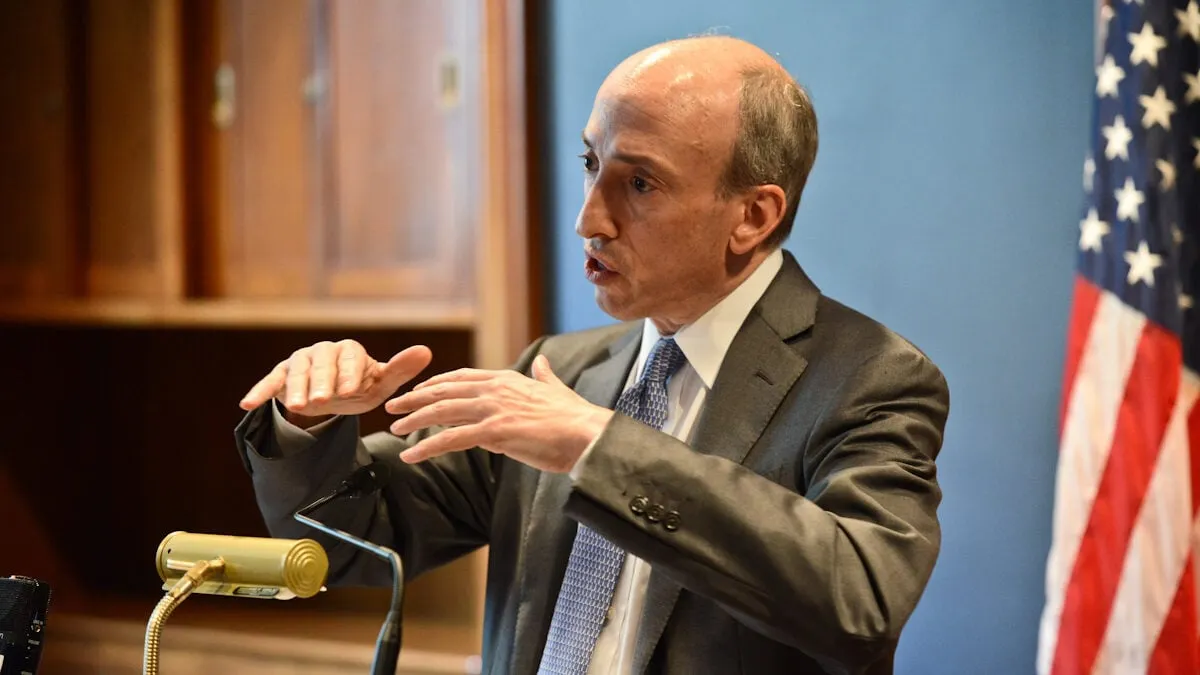New Grayscale amendment just dropped. Clear language on cash only but still no AP named, just blanks where name should go. Not sure why since SEC wants to see it and they have been pretty cocksure about having one. Also, nothing on fee (that I could see). That's big open q too. https://t.co/tQ9MTBlvg8 pic.twitter.com/id8Tb8ImaP
— Eric Balchunas (@EricBalchunas) January 2, 2024
Coin Prices
BTC
$118,530.00
-0.23%ETH
$3,822.95
-1.44%XRP
$3.14
-3.38%BNB
$825.95
-2.90%SOL
$182.89
-4.74%USDC
$0.999765
-0.00%STETH
$3,818.39
-1.42%DOGE
$0.227265
-5.83%TRX
$0.340707
4.62%ADA
$0.795613
-4.00%WSTETH
$4,610.51
-1.51%WBTC
$118,280.00
-0.27%HYPE
$44.80
1.16%SUI
$3.90
-7.99%XLM
$0.425466
-3.43%LINK
$18.12
-5.00%WBETH
$4,100.98
-1.56%HBAR
$0.273568
-3.64%BCH
$566.39
-3.36%WEETH
$4,094.11
-1.46%AVAX
$24.71
-9.36%WETH
$3,823.10
-1.42%LTC
$109.09
-3.79%LEO
$8.97
0.08%TON
$3.26
-3.98%SHIB
$0.00001334
-5.34%USDE
$1.001
-0.01%USDS
$0.999702
0.00%BSC-USD
$0.999111
0.06%WBT
$44.25
-0.85%CBBTC
$118,524.00
-0.20%UNI
$10.30
-5.82%DOT
$3.99
-5.48%XMR
$320.73
-2.20%BGB
$4.56
-2.01%PEPE
$0.0000118
-8.22%CRO
$0.144785
0.28%SUSDE
$1.19
0.07%AAVE
$286.30
-5.79%ENA
$0.611672
-8.45%TAO
$400.10
-7.43%NEAR
$2.75
-6.90%ETC
$22.17
-3.73%PI
$0.436624
-2.66%ONDO
$0.980976
-6.97%ICP
$5.56
-5.69%JITOSOL
$222.94
-4.61%OKB
$48.40
-1.45%MNT
$0.776314
-5.52%APT
$4.68
-4.57%KAS
$0.098125
-5.20%PENGU
$0.0394322
-6.26%BONK
$0.00003172
-8.49%BUIDL
$1.00
0.00%WETH
$3,814.75
-1.34%ALGO
$0.265545
-5.22%ARB
$0.435251
-7.26%USD1
$0.997884
-0.22%VET
$0.02515225
-3.85%ATOM
$4.65
-4.63%GT
$17.71
-2.83%RENDER
$4.03
-7.30%POL
$0.229405
-4.58%WLD
$1.10
-9.41%SPX
$2.13
-5.79%FTN
$4.59
0.04%TRUMP
$9.59
-6.56%SEI
$0.330657
-4.12%FET
$0.716687
-6.66%SKY
$0.086673
-11.00%BNSOL
$194.50
-4.79%RETH
$4,349.18
-1.48%QNT
$123.61
-3.95%FLR
$0.02561701
3.42%FIL
$2.61
-5.75%RSETH
$4,008.98
-1.43%LBTC
$118,373.00
-0.37%IP
$5.70
0.69%JUP
$0.557445
-7.87%SUSDS
$1.061
0.02%JLP
$5.07
-1.64%XDC
$0.092668
1.05%KCS
$11.55
0.04%OSETH
$4,024.96
-1.28%USDTB
$0.999775
0.01%TIA
$1.99
-3.23%INJ
$14.68
-8.42%METH
$4,090.31
-1.48%CRV
$1.01
-0.46%LSETH
$4,127.16
-1.51%USDT0
$0.999468
-0.10%CFX
$0.269452
43.10%FDUSD
$0.996811
-0.28%OP
$0.754934
-7.88%NEXO
$1.30
-2.08%EZETH
$4,020.21
-1.31%STX
$0.791844
-6.42%USDT
$0.999922
-0.00%USDF
$0.99955
0.01%FLOKI
$0.00012071
-7.36%FARTCOIN
$1.15
-16.92%IMX
$0.580624
-3.36%EETH
$3,806.03
-1.49%SOLVBTC
$118,110.00
-0.28%JUPSOL
$205.91
-4.53%WBNB
$825.72
-2.72%WIF
$1.032
-9.28%GRT
$0.103796
-5.44%CAKE
$2.97
-7.29%S
$0.313511
-7.38%USDC
$0.998881
0.11%LDO
$1.075
-7.88%ENS
$28.96
-4.70%VIRTUAL
$1.45
-7.95%SAROS
$0.360646
0.93%WBTC
$118,341.00
-0.25%MSOL
$239.84
-4.75%KAIA
$0.160738
-5.12%PAXG
$3,324.14
-0.43%PYUSD
$1.00
0.03%CLBTC
$119,464.00
0.53%SYRUPUSDC
$1.11
0.09%XTZ
$0.859138
-4.86%A
$0.54749
-5.51%THETA
$0.862414
-7.53%RAY
$3.12
-6.49%PUMP
$0.00233917
-17.22%SUPEROETH
$3,821.44
-1.43%XAUT
$3,307.03
-1.03%JASMY
$0.01677204
-4.38%CGETH.HASHKEY
$4,030.87
-1.73%IOTA
$0.205437
-5.23%CMETH
$4,090.23
-1.25%GALA
$0.01713973
-6.88%PYTH
$0.129276
-6.72%PENDLE
$4.43
-5.12%SAND
$0.300021
-5.35%AERO
$0.835893
-6.63%OUSG
$111.97
0.02%BTT
$0.00000071
1.26%JTO
$1.92
-6.99%USDY
$1.087
0.90%TBTC
$118,217.00
-0.29%USDX
$0.997625
-0.04%ZEC
$40.92
-4.64%WETH
$3,821.34
-1.45%FLOW
$0.399456
-5.29%HNT
$3.42
-6.34%WAL
$0.440575
-7.11%AB
$0.00855835
-0.28%ETHX
$4,057.84
-1.68%MANA
$0.307737
-4.91%SYRUP
$0.488188
-8.02%USD0
$0.997647
-0.00%MORPHO
$1.81
-6.61%DOGE
$0.226794
-5.74%RLUSD
$0.99954
-0.01%MOG
$0.00000148
-9.21%BTC.B
$118,404.00
-0.38%XSOLVBTC
$118,668.00
0.40%BSV
$28.37
-4.03%USDD
$1.00
0.07%WETH
$3,822.78
-1.43%CBETH
$4,211.96
-1.50%CORE
$0.545683
-3.81%BDX
$0.076961
2.89%BRETT
$0.055129
-8.01%XCN
$0.01573195
-4.07%M
$0.320889
-7.27%TEL
$0.00559409
-9.13%AR
$7.83
-0.45%SWETH
$4,182.23
-1.55%RSR
$0.00858747
-5.15%KTA
$1.24
17.10%ETHFI
$1.20
-5.22%RUNE
$1.43
-4.38%APE
$0.623624
-4.84%TUSD
$0.997244
-0.10%NFT
$0.00000049
4.08%STRK
$0.130473
-5.97%B
$0.465498
-0.67%NEO
$6.57
-3.46%AIOZ
$0.391055
-5.09%FRXETH
$3,822.89
-1.22%WHYPE
$44.72
1.02%DYDX
$0.607854
-6.19%SDAI
$1.16
-0.04%COMP
$48.39
-5.34%ZBCN
$0.00527543
22.65%EGLD
$15.83
-6.81%WETH
$3,817.26
-1.53%XEC
$0.00002218
-4.63%TETH
$4,627.34
-1.44%DEEP
$0.172743
-8.15%SUN
$0.0223369
8.17%EIGEN
$1.34
-5.39%KAVA
$0.39043
-3.15%WEMIX
$0.936206
-9.83%DEXE
$7.30
-2.30%TRIP
$14.08
1.92%BEAM
$0.00805599
-5.04%ZK
$0.057022
-5.74%USDC.E
$0.999786
-0.00%USYC
$1.095
-0.03%AXS
$2.45
-7.83%CHZ
$0.04179051
-4.87%USDB
$1.001
1.20%W
$0.085677
-3.28%TKX
$5.01
-45.39%USDT
$0.998459
-0.38%DAI
$1.00
0.06%JST
$0.04016593
6.97%WAVAX
$24.70
-9.24%USTB
$10.76
0.01%VENOM
$0.187483
1.50%SUPER
$0.861435
-3.57%RON
$0.558711
-3.96%SAVAX
$30.03
-9.19%ATH
$0.03643731
5.87%1INCH
$0.275969
-4.03%AXL
$0.379871
-5.10%BBSOL
$200.71
-4.63%UBTC
$118,343.00
-0.39%CVX
$4.61
-16.71%STHYPE
$44.64
1.10%MOVE
$0.143753
-4.98%REKT
$0.00000087
-15.28%OHM
$22.41
0.21%EOS
$0.547484
-5.26%AKT
$1.33
-6.02%GNO
$135.10
-7.25%EBTC
$116,843.00
-1.01%WBTC
$118,227.00
-0.37%LUNC
$0.0000611
-4.25%TURBO
$0.00495035
-4.67%POPCAT
$0.348267
-9.43%TWT
$0.807458
-5.11%DOG
$0.00335982
-9.32%CTC
$0.731723
-2.72%ETH+
$4,015.63
-1.44%SFRXETH
$4,302.59
-1.47%MATIC
$0.229169
-4.55%AMP
$0.00378798
-3.72%QUBIC
$0.0000026
16.46%USDG
$0.999513
-0.03%USELESS
$0.312086
-23.93%BUSD
$0.999833
-0.10%KAITO
$1.29
-5.80%




